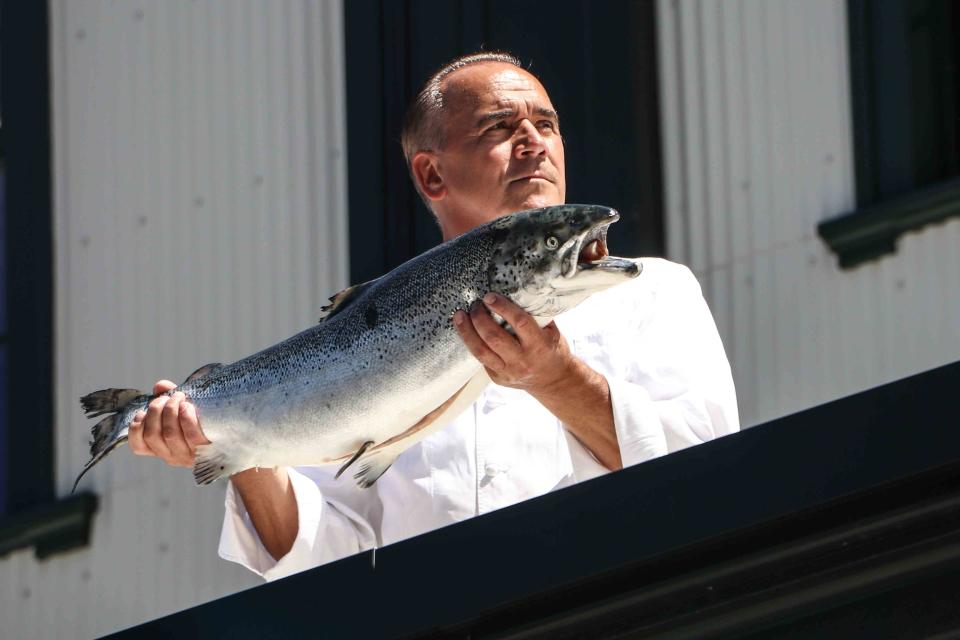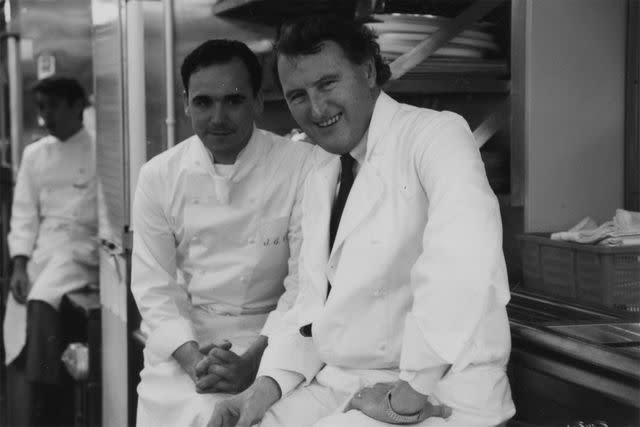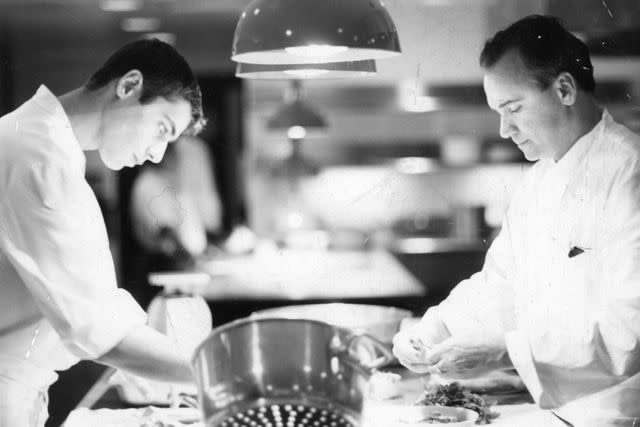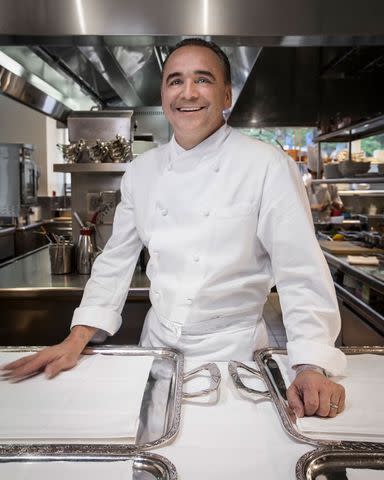Jean-Georges Vongerichten’s Lessons From 50 Years of Cooking
- Oops!Something went wrong.Please try again later.
If he could have it his way, the chef would open a restaurant every month.

Courtesy of Jean-Georges Restaurants
It’s July 14, 1973, and Jean-Georges Vongerichten is washing dishes to kick off an apprenticeship at Auberge de l'Ill in Alsace, France. It’s not a grand entrance into the industry. “The only thing I wanted to do was leave my parents house. I wanted to live my life,” he says half a century later, grinning from the window booth at Happy Monkey.
The Latin restaurant with live music, margaritas, and stellar seafood debuted in Greenwich, Connecticut, in May 2022, followed just two months later by the chef’s massive Tin Building marketplace in Manhattan’s Seaport District — a project with 12 dining concepts and four bars. That’s more than a dozen debuts last year.
After opening 50 restaurants worldwide by his 50th year of cooking milestone, Vongerichten still says that first day in Alsace is when he’d made it. “Right away I knew, this is it. I’m out. I can do whatever I want.”
Related: 23 Jean-Georges Vongerichten Recipes
And he did, cooking on a ship in the French army and then for his mentor Louis Outhier and Paul Bocuse at three-Michelin-starred L'Oasis in the South of France, followed by Eckart Witzigmann in Munich. Reuniting with Outhier at the Oriental Hotel in Bangkok, Vongerichten would open the chef's restaurants around Asia from 1979 to 1985, when he moved to Boston to cook at Le Marquis de Lafayette. There he hired Pierre Schutz, who would join Vongerichten in New York, eventually as his chef at Vong for 15 years and The Mark Restaurant for the last 13 years.
A core team is crucial
Working with Vongerichten for decades is not uncommon. Jean-Georges Management president and CEO Lois Freedman left a desk job for culinary school and went from the back of the house at Lafayette to the front of the house at 66 and Spice Market to running the restaurant group, where she’s worked since 1986.
Vongerichten met Happy Monkey executive chef Ron Gallo at Lafayette in the Drake Hotel in 1987. The former New York City restaurant — where he'd also met Freedman — is where Vongerichten made a name for himself and his style of cooking while helming the kitchen for Outhier from 1986 to 1991.
“Quality ingredients, market-driven, all organic food. Nothing processed,” is how he defines it. “People come and eat, and they realize that they feel good the next day.”
Gregory Brainin lights up one night when I ask why he’s worked for Vongerichten for more than 20 years. The executive vice president of culinary development for Jean-Georges Management bought Vongerichten's Simple Cuisine cookbook in 1990 and never looked back. He says his connection with the chef’s cooking philosophy and concept of having three elements to each dish is how they work together so well on the culinary side. As a child, Vongerichten imagined being an architect or designer, and he puts that passion for colors, layers, and textures onto the plate.

Courtesy of Jean-Georges Restaurants
Jean-Georges Vongerichten (left) with his mentor Louis OuthierPushing boundaries opens doors
Vongerichten did get a hand in design with his first open kitchen. In 2012, he blogged about how revolutionary the format was in 1986. When The Drake hotel management expected him to prepare fine dining for 500 rooms from the same kitchen as its casual cafe, the chef expected a second kitchen would be constructed. The property’s only space was in Lafayette’s dining room, and Vongerichten reasoned that the kitchen should be open if it was going to be that close to the guests anyway.
“I had come up in the classic French system, where we cooked behind closed doors. But I started moving away from tradition, both in my cooking and in my conception of what a restaurant could be,” he wrote. “Diners loved it, begged for seats by the kitchen, and watched us cook as if we were on TV. I learned quickly that we had to be as choreographed as a ballet. It was the first time I cooked with total transparency between the diner and chef. I made sure all my cooks were well groomed and we dropped the habit of tasting with fingers and only ever used clean spoons. Plus, I had to keep the noise level down. No screaming cooks in my house.”
Vongerichten was “breaking new ground,” wrote The New York Times in 1991, when he opened his own restaurant, JoJo, on Manhattan’s Upper East Side where it continues to thrive. The chef combined his familiarity with Asian ingredients and French training for an early interpretation of fusion cuisine. His preference for oils — basil, chive, tomato — over butter or cream earned him a reputation for lighter food amid the prevailing low-fat food era of the '90s, but not for lack of pleasure. JoJo is afterall where Vongerichten pioneered molten lava cake and more timeless dishes.
After 25 years, the decor and menu were refreshed in 2017, and 14 items were kept among daily specials: a tuna spring roll with soybean coulis; steamed black sea bass with carrot confit, cumin, and orange; tuna tartare with avocado and spicy radish and a ginger marinade. "He has a blissful way with acidity and chilli heat," Jay Rayner wrote in The Guardian years later.
“We did something different: wine that people had never heard of from small producers in France; I was going to the market really cooking for the neighborhood; and the first night there was a line outside,” he says. “You have to really think and not just open to open, you have to be smart about it.”
That mentality delayed his eponymous restaurant’s debut in 1997, but his flagship Jean-Georges has stood the test of time, winning the James Beard Awards for Best New Restaurant in 1998 and Outstanding Restaurant in 2009. It maintained three Michelin stars for more than a decade, with two today; and garnered four stars from The New York Times. Both landmark restaurants cemented the chef’s signature French technique with Asian influences and fresh, quality ingredients. Vongerichten can still be spotted at the Union Square Greenmarket in the early mornings.

Courtesy of Jean-Georges Restaurants
Jean-Georges Vongerichten cooking with his son CedricHe went on to open eight restaurants in the next 10 years and more than 25 restaurants in the following decade. Farm-to-table ABC Kitchen was Esquire’s 2010 Restaurant of the Year and won the 2011 James Beard Award for Best New Restaurant. The rustic Inn at Pound Ridge “scored a 10” from Greenwich Time and was named as one of the Hudson Valley’s best new restaurants in 2014 by Hudson Valley magazine. In 2017, two years after the New York Post headline, “Can a meatless restaurant make it in New York City?” abcV opened, and today it’s first on the Michelin Guide’s list of best vegetarian restaurants in NYC.
Some good things come to an end
“It’s not all success, we close some as well,” Vongeichten says. “Some places we lose leases, some places it doesn’t work out, we have to do something else, walk away from it.”
New Yorkers remember his former restaurants fondly. When Mercer Kitchen closed after 25 years, Time Out New York credited the restaurant known for celebrities and the concept of communal tables with “shaping New York's gastronomic scene.” When Spice Market shuttered after 12 years, Eater called it a “focal [point] of the Meatpacking District’s clubstaurant scene.” The Gayot dining guide described the food at Vong as “perfect fusion, layering French and Thai flavors in an exquisite presentation” before it closed in 2009 after 17 years of service.
“You have to start fresh again,” Vongerichten says. “Once you know the formula you know what to do: a good space, good design, good lighting. Be in touch with the zip code. Go to the market. Be excited about product. Watch people eat. Be in touch with what’s happening. It’s simple; it’s about pleasing guests. Make sure the staff is happy. Bring something unique.”

Courtesy of Jean-Georges Restaurants
Success is fleeting
Throughout his 50-year career, the only time Vongerichten truly feared his fate was all-too-unsurprisingly during the pandemic. “For 10 days my entire life stopped when they shut down everything in New York on my birthday, March 16, 2020,” he says. “In Asia, they reopened everything on the 25th of March. So from the 16th to the 25th, I had no restaurants. What the hell am I going to do now?” he reenacts asking, clutching his chest.
"I came with my suitcase as an immigrant in New York. When that’s in you, you take all the risk."
In the back of his mind, Vongerichten always knew that everything could collapse tomorrow, even as his group expanded to Tokyo, Kyoto, Shanghai, Hong Kong, and Singapore, because he braved opening JoJo amid the Gulf War and a recession.
“It’s very fragile, I always think, as a vagabond,” he explains. “I came with my suitcase as an immigrant in New York. When that’s in you, you take all the risk. A suitcase away. Just a flight away to somewhere else, a new adventure.”
Over time, his exploration has evolved from traveling to Indonesia and Italy to experience ingredients, cuisines, and regions first-hand, as well as researching with books in libraries, to accessing everything he needs to learn on his phone and watching AI generate a “JG” scallop that’s “pretty accurate.” But Vongerichten’s greatest adventure is still opening new restaurants.
"If I could have it my way the rest of my life, I would open a new concept a month and then after that I’d give you the key to take care of it for the next 20 years."
“If I could have it my way, 100%, I would open a restaurant every month,” he says. “After one month, it becomes routine. It’s exciting to come up with the vision, the menu, and you can never repeat your first month. It gets better as it goes, the restaurant, but the first month is the best. If I could have it my way the rest of my life, I would open a new concept a month and then after that I’d give you the key to take care of it for the next 20 years. I think that’s why we have [so many] restaurants.”
And he's open to more. “What’s important is that it’s only food,” Vongerichten says. “Writing a book is harder because it’s in print forever. A menu, you can rip it up tonight and start fresh tomorrow. I love it. That’s the best part of it. Restart every morning fresh.”
Longevity is reinventing yourself, says the chef of Asian, French, Latin, steakhouse, and vegan concepts in a dozen countries. “50 years, and I still run to work,” he beams. “I’m just warming up.”
For more Food & Wine news, make sure to sign up for our newsletter!
Read the original article on Food & Wine.

